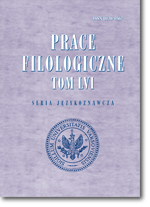Cechy dialektalne wielkopolskich rot sądowych w świetle badań nad rękopisem poznańskiej księgi ziemskiej
Dialectical Features of Great Poland Rotas in the Light of Research on Poznań Land Book Manuscript
Author(s): Maria TrawińskaSubject(s): Language and Literature Studies
Published by: Wydział Polonistyki Uniwersytetu Warszawskiego
Keywords: dialektologia historyczna; roty sądowe; grafia; historical dialectology; rotas; graphy
Summary/Abstract: I seek to answer the question whether the 14th century Poznan book can be regarded as reflecting dialectical features of Great Poland in the light of historical research and graphical analysis of Polish notes. The research is based on the oldest (judicial) preserved land book which contains 3150 Latin notes, 417 of which are Polish. The most important phonetic features which are necessary for specifying the range of the Great Poland dialect are the following: the change of {ra-} into {re-}, the change of {ja-} into {je-} and the related transition of -{’a} into -{’e}, the {’o} || {’e} fluctuation, the retaining of the {-χv-} group and the alternation of -{’ev-} to -{’ov-}. Despite the entire graphical complexity of material, no examples of the transition of {ja-} into {je-} has been attested. Without any exception the initial {ra-} was retained. Despite certain graphical questions concerning deciphering -{’ev-} and -{’ov-}, it is possible to ascertain that the -{’ev-} forms were prevailing, which is not an exclusive feature of Great Poland. The characteristic feature of the book is the simplification of the {-χv-} group, which is considered to be an exclusive feature of Little Poland. Our findings prompt the question whether or not the book in question can be regarded as a typical Great Poland relic, since it does not corroborate the dialectical features of this region.
Journal: Prace Filologiczne
- Issue Year: 2009
- Issue No: 56
- Page Range: 345-360
- Page Count: 16
- Language: Polish

